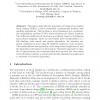Free Online Productivity Tools
i2Speak
i2Symbol
i2OCR
iTex2Img
iWeb2Print
iWeb2Shot
i2Type
iPdf2Split
iPdf2Merge
i2Bopomofo
i2Arabic
i2Style
i2Image
i2PDF
iLatex2Rtf
Sci2ools
135
click to vote
EVOW
2009
Springer
2009
Springer
Finding Balanced Incomplete Block Designs with Metaheuristics
This paper deals with the generation of balanced incomplete block designs (BIBD), a hard constrained combinatorial problem with multiple applications. This problem is here formulated as a combinatorial optimization problem (COP) whose solutions are binary matrices. Two different neighborhood structures are defined, based on bit-flipping and position-swapping. These are used within three metaheuristics, i.e., hill climbing, tabu search, and genetic algorithms. An extensive empirical evaluation is done using 86 different instances of the problem. The results indicate the superiority of the swap-based neighborhood, and the impressive performance of tabu search. This latter approach is capable of outperforming two techniques that had reported the best results in the literature (namely, a neural network with simulated annealing and a constraint local search algorithm).
Related Content
| Added | 24 Jul 2010 |
| Updated | 24 Jul 2010 |
| Type | Conference |
| Year | 2009 |
| Where | EVOW |
| Authors | David Rodríguez Rueda, Carlos Cotta, Antonio J. Fernández |
Comments (0)

